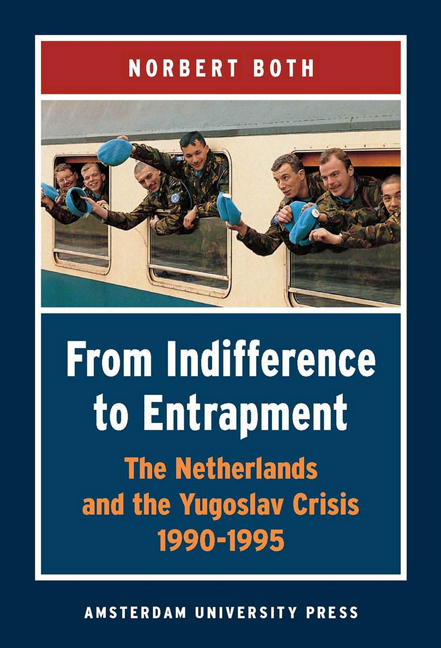Book contents
- Frontmatter
- Dedication
- Contents
- Preface
- Abbreviations
- Chronology
- Introduction
- 1 The Netherlands and its Foreign Policy System
- 2 An Emerging Challenge, July 1990 - June 1991
- 3 From ‘Even-Handedness’ to ‘Selectiveness’, July -December 1991
- 4 Moral and Political Entrapment: The Netherlands and International Peace Plans for Bosnia, 1992-1994
- 5 Military Entrapment: The Commitment to Srebrenica
- Conclusion
- Bibliography
- Index of Names
- Frontmatter
- Dedication
- Contents
- Preface
- Abbreviations
- Chronology
- Introduction
- 1 The Netherlands and its Foreign Policy System
- 2 An Emerging Challenge, July 1990 - June 1991
- 3 From ‘Even-Handedness’ to ‘Selectiveness’, July -December 1991
- 4 Moral and Political Entrapment: The Netherlands and International Peace Plans for Bosnia, 1992-1994
- 5 Military Entrapment: The Commitment to Srebrenica
- Conclusion
- Bibliography
- Index of Names
Summary
This book has provided an analysis of Dutch foreign policy regarding the Yugoslav crisis from 1990 until 1995. Its main conclusion is that the Netherlands was an important and influential player in the international community's intervention in the former Yugoslavia during this period. This is a significant conclusion if one bears in mind that the Netherlands is a smaller state, or ‘pocket-sized medium power’, and that mainstream Realist International Relations theory assumes that smaller states have no serious role of their own to play in international affairs. A second conclusion is that the Netherlands was particularly influential during its term as EC Presidency in 1991, which suggests that it is easier for a smaller state to have an impact when its external environment is marked by a shared desire to cooperate and by respect for shared norms and rules. Third, despite the constraints imposed on the Netherlands by its external environment, domestic factors played an important, sometimes even decisive, role in determining the foreign policy behaviour of the Netherlands. In particular between August 1992 and late 1993, shared ideas and beliefs among the civilian elements of the Dutch foreign policy elite, as well as a domestic (bureaucratic) political conflict centering on the Defence Ministry's reluctance to deploy infantry in Bosnia-Herzegovina, had a decisive impact on Dutch policy. Finally, this book has highlighted the importance of distinguishing between ‘influence’ and ‘success’: between August 1992 and July 1995 the Netherlands, while influential, entrapped itself in the Bosnian war and was severely punished for it, almost as if it had violated Waltz's ‘law of gravitation’.
Dutch Influence
No evidence was found to support a claim that the Netherlands was an influential player during the period of July 1990 until June 1991, when the Yugoslav crisis had not yet descended into armed conflict. However, the question of whether the Netherlands was influential at this stage proved to be an irrelevant one for the Yugoslav crisis simply did not constitute a foreign policy concern for the international decision makers.
The situation was altogether different during the second half of 1991. Between July and December 1991 the Netherlands was at its most influential, which is not to say that the Dutch EC Presidency made no mistakes or at times failed to exert influence.
- Type
- Chapter
- Information
- From Indifference to EntrapmentThe Netherlands and the Yugoslav Crisis, 1990–1995, pp. 225 - 242Publisher: Amsterdam University PressPrint publication year: 2012



